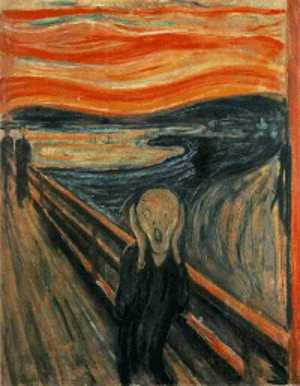Overcome the Fear of Going Crazy
Worried that you’re going mad? Read this.
 "Am I going crazy?" courtesy of oddsock
"Am I going crazy?" courtesy of oddsockShe fears she's going crazy. He wants her to think she's going mad so he can have her locked up in an institution. She hears footsteps in the attic, pictures vanish from the walls only to reappear later, and - perhaps most frightening of all - the gaslights fade and brighten seemingly of their own accord.
She comes to believe she is losing her mind. This scary plot from the 1944 film Gaslight hits a real nerve for many people. After all, who hasn't sometimes worried they might be... well, losing it?
What does 'going crazy' mean?
People often joke about going crazy, nuts, losing it, 'going loco'. We describe people as crazy if they are a bit eccentric or individualistic or prone to strong emotion. Free-thinkers may be described as mad; and certainly many of history's greatest thinkers have been branded crazy at some time (1).
Or we might assume that violent people are 'completely mad'; but most violence is committed by the clinically sane. Violence may be perpetrated through culturally determined ways like gang behaviour and such like. Violent people often know exactly what they are doing - they may be psychopathic (without a real moral code), but are rarely psychotic (genuinely delusional) (2).
What we really mean by 'insane, mad, or genuinely crazy' is the state of mind people experience when they are suffering from a psychotic illness or episode, usually brought on by a predisposition to schizophrenia or bipolar disorder (3). If you have a history of psychotic illness and fear it's happening again, make sure you have plenty of support.
So 'going mad' is not being temporarily emotional (all strong emotions make us less rational), but experiencing a 'psychotic episode' in which the sufferer hears or sees things that are not there or believes things that are very at odds with what most people believe to be the case. (One man I worked with believed he was the King of England - he wasn't.)
Yes, I know we can all be a bit deluded in some ways, but I'm talking about full-blown hallucinations here.
People can bear all kinds of horrific ordeals without ever going crazy (which really means becoming psychotic). A lot of what people mix up in their minds as to what 'being mad' means is no such thing. Nature wants to keep you sane and rational, even when you feel overwhelmed.
Nothing to fear but fear itself?
True 'madness' really means experiencing psychotic illness, which:
- Most people don't suffer from because they have no predisposition towards it.
- Even in people who do suffer repeated psychotic episodes, the illness can often be effectively managed.
Worrying about going crazy makes you more worried - it doesn't make you crazy. But can't we all go a bit mad sometimes?
Temporary craziness
We can all be temporarily 'insane' if we are deprived of sleep for long enough - because sleep deprivation means we can start to dream when we're awake. I recall working for three nights in a row and eventually 'seeing' white doves flying around indoors. But I knew I was hallucinating; true 'madness' means believing in the reality of an illusion.
I know, I know, we could start talking about people's political beliefs here, but let's stick to proper 'craziness'. Sleep-deprived madness is corrected when you sleep (and your dreaming brain is allowed to do its work properly).
Another risk factor for experiencing genuine crazy states in a person not genetically predisposed to psychosis is, of course, taking huge amounts of cannabis or hallucinogenic substances. We all need all the sanity we can get, so obviously it's sensible to steer well clear.
When most people fear going crazy, what they really fear is becoming stressed to the point where they feel they can't cope with life's demands. Not craziness.
Not mad - just stressed
Just about any emotional problem we care to mention, from a psychotic episode to depression or the onset of addiction, is precipitated by a build-up of stress and anxiety. Stress and emotion make us less able to 'think straight' (4). Being very stressed and feeling overwhelmed is not a sign that you are going crazy. Neither are panic attacks, which are extremely common.
I repeat: because these experiences make it harder to think clearly and can make us feel more out of control than we in fact really are, some people assume they are going crazy. People often talk about madness or craziness when they really mean just stressed out. The more you relax, the more 'sane' you feel.
If you worry you are going crazy, then ask yourself:
- Am I getting enough sleep?
- Am I working too much?
- Are my work/personal relationships causing me stress?
- Am I eating properly?
- Am I seeing enough people socially or have I become isolated?
- Am I drinking too much alcohol?
- Am I chronically worried about anything?
If you are experiencing any of the above problems, then you will feel more or less stressed (depending on how you, as an individual, respond to stress) and this will make it harder for you to think logically and may make you feel a bit confused.
The vast majority of people never go crazy; the vast majority of people fear, at some time or another, that they may go crazy. Make sure you fill your time with meaningful activity, get enough sleep, and manage stress.
Of course, too much rationality and control can cause its own problems. To quote Janet Long, "Part of being sane, is being a little crazy." Now what do you think that means?
References
- Back in the 1840s, Dr. Ignaz Semmelweis, a Hungarian physician and assistant in the maternity wards of a Vienna hospital, was widely considered to be mad by other medical professionals for 'crazily' suggesting it would be a good idea (in the sense that many lives would be saved) if midwives and other medical staff washed their hands before helping women with delivery.
- According to results cited in the National Institute of Mental Health's Clinical Antipsychotic Trials of Intervention Effectiveness (CATIE) study, most severely psychotic people are not violent, as is popularly believed. The study looked at whether anti-psychotic medication was effective in stemming the violence in the rare subset of psychotic patients who were violent. Marvin Swartz, professor of psychiatry and co-author of the study, said that "a small proportion of patients with schizophrenia become seriously violent, while most do not."
- About 1 in 100 people have a predisposition to developing schizophrenia or bipolar disorder, according to the World Health Organization. Compare this to the lifetime incidence of developing depression: about one in two for women and one in five for men. There is little evidence that clinical depression is caused genetically, but some evidence that schizophrenia and bipolar disorder have more of a genetic basis.
- See Daniel Goleman's wonderful description of 'emotional hijacking' in his ground-breaking 1996 book, Emotional Intelligence: Why it can matter more than IQ.






